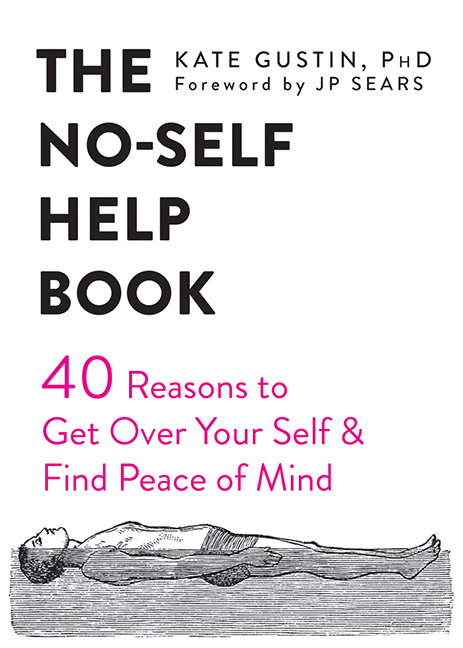By Kate Gustin, author of The No-Self Help Book
Seeking self-esteem is like trekking through the Himalayas hoping to find a Yeti. We tell ourselves: “Just keep scaling the slopes—looking, achieving, producing, accumulating—and eventually I will get there. I will feel good about myself.” But when have we ever found the mythical creature? When have we ever found a self that is good enough?
Research shows trying to secure self-esteem comes with many risks.
-
When people base self-esteem on external sources—such as other people’s approval of them, their appearance, or their academic performance—they report more stress, anger and eating disorder symptoms, more academic and relationship problems, increased rates of alcohol and drug use (1).
-
There is an association between contingent self-esteem—which is self-worth dependent upon others’ feedback—with greater depressive symptoms and suicidal behavior (2).
-
Performance-based self-esteem is a strong predictor of burnout over time for working men and women (3).
-
Younger adults who are depressed report wanting boosts to their self-esteem, yet find they do not actually like the boosts (4).
-
For people with low self-esteem, positive self-related information tends to create anxiety (5).
In fact, recent research supports a view of self-esteem as more of a process than an object or trait. Like most processes, self-esteem has been found to vary over time and with circumstance. So why are we trying to derive lasting self-worth from a conditional source?
Rather than endlessly trekking after this Yeti, we would benefit more from investigating the roots of this issue: what drives the quest for self-esteem to begin with. What are we fundamentally lacking that we need to bring in from without? Might self-esteeming be a symptom of a more deeply seated cultural illusion? Let’s look at this self we’re always trying to affirm and improve.
The story of self, as the mind constructs it, tends to be a static narrative that depicts the self as a solid, stable unit fixed in time and space. We tell ourselves: This is who I am. The “this” may vary, but the content is frequently a memory-based description of oneself, usually built upon past experiences, reified through language into a rigid sense of identity. Rigidity comes with costs. Those who construe their self as stable, rigid, and unchanging tend to suffer decreases in well-being and self-esteem when confronted with identity conflict (6).
Those who perceive the self as flexible do not suffer such effects. It may not serve us to take our sense of our self so seriously, forgetting that it is, in fact, a sense of something. Neuroscience tells us that the self is more of a process than a fixed entity. We are perpetually involved in the activity of selfing, evolving in response to our environment and interactions.
So what lies underneath the personal narrative? Is there an underlying “me” that’s doing the selfing, and does it have inherent value?
Buddhism has long inquired into the self’s unquenchable thirst for validation, the root of self-esteem issues. Its antidote lies, not in how to find the self-esteem Yeti, but in understanding our fundamental nature as no-self. No-self can be understood as an open context for who we are: a field or potentiality. It is the fertile ground of awareness that we all share, out of which emerges individual differences in thoughts, emotions, actions, beliefs, personalities, relationships, decisions, bodies, and more.
From the perspective of no-self, the issue of self-esteem becomes irrelevant. The self and its esteem is a narrative, a story we tell about ourselves that’s built on top of the ground of no-self consciousness. The no-self substrate of consciousness is complete as is. It does not require cheerleading, approval, or proving. It is inherent goodness.
We can direct our attention away from the self-esteem narrative, existing just as well without it, through mindfulness training. Mindfulness training teaches us how to redirect our focus from selfing behaviors toward the clean slate of the present moment. Mindfulness practices facilitate a more inclusive, integrated knowing of ourselves. A multitude of studies show that transcending the self narrative is good for us.
The upshot is that no-self, rather than being a negation of who we are, is in fact the most whole and healthful expression of what we are. Thus, a good enough core really does exist at the center of our being. Unlike self-esteem, we do not need to earn, produce, or achieve no-self. It constitutes what we are from the outset.
Sources
-
https://spssi.onlinelibrary.wiley.com/doi/abs/10.1111/1540-4560.00279
-
https://www.ncbi.nlm.nih.gov/pubmed/?term=blom+2012+burnout+self-esteem
-
https://www.tandfonline.com/doi/abs/10.1080/15298868.2015.1117524
Kate Gustin, PhD, is a clinical psychologist practicing in the San Francisco Bay Area.



 2024 Peace Playbook: 3 Tactics to Avoid Clashes with Your Partner
2024 Peace Playbook: 3 Tactics to Avoid Clashes with Your Partner